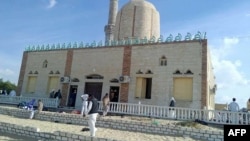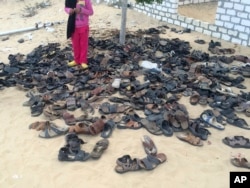Villagers in Bir al-Abd in Egypt’s northern Sinai, scene of a devastating jihadist attack on a crowded Sufi mosque Friday that left more than 300 dead, have added to doubts about the competence of the country’s counterterror efforts.
They argue security forces missed the warnings signs of a pending jihadist attack. Amid the mourning for the 305 dead, villagers are expressing frustration to local media about what they say was a lack of alertness by local security forces, who should have been ready for an attack.
They say they received increasing jihadist threats prior to Friday’s assault, the deadliest terrorist attack in Egyptian modern history, warning them of a possible assault on Rawda mosque, according to interviews with Al-Masry Al-Youm, a privately owned newspaper.
“We received warnings about 10 days ago from the gunmen not to [perform Sufi rituals],” said Abo Jarir. The militants said Sufi practices are “contrary to Islam,” he added.
Other villagers told local media that threats against the mosque, which was packed Friday with about 400 worshipers, first started a year ago when the Islamic State terror group singled out Rawda mosque in its weekly online newspaper.
Egypt’s President Abdel Fattah el-Sissi announced three days of national mourning following Friday’s attack, which also left 128 wounded, and promised brutal retaliation. Hours after the assault involving about 30 gunmen, who set off explosives and sprayed worshipers with automatic gunfire in a 25-minute-long slaughter, Egyptian military launched airstrikes on the hideouts of IS-tied militants they say were behind the killing.
New style of attack
The attack was well-planned, according to public prosecutors, who say between 25 to 30 bearded gunmen dressed in black started the killing spree by opening fire through the mosque’s doors and windows and threw in fragmentation grenades. They chased worshipers who managed to flee the mosque and gunned them down in the streets.
No one has claimed responsibility for the assault, but it is assumed by analysts to be the work of the Islamic State affiliate, Wilayat al-Sinai (Sinai Province). Officials say the gunmen carried black IS flags.
The attack marks a change in tactics for jihadists in Egypt. Until now thy have focused their attacks on security forces and Christians, launching assaults on Coptic churches and military barracks, killing hundreds. Last year, they beheaded a Sufi cleric who they accused of witchcraft.
But Friday’s assault was the first in Egypt on a mosque controlled by Sufi Muslims, who revere saints and use music and dance in their worship.
IS and other Salafi-jihadist groups accuse Sufis of mysticism and heresy and while they have not been targeted en masse before in Egypt, their shrines have been attacked in neighboring Libya and Pakistan.
Egypt launched a counterterror effort in northern Sinai, a highly marginalized and neglected area, in August 2011, but a rising death toll since and strikes beyond the peninsula by the militants have led to criticism by analysts and locals of the tactics being employed, which have focused under Sissi on brute strength with little efforts made to win hearts and minds or to tackle root causes of radicalization.
Egyptian authorities have been accused by rights groups of torturing suspects, extra-judicial killings as well as demolitions of homes, forced evacuations and destruction of property and farms as well as the use of heavy artillery and aerial bombardment of residential areas.
Roots of radicalization
U.S. and European officials have urged Egyptian authorities, mainly in private, to adopt a more sophisticated counter-terror approach. On Saturday, Alistair Burt, British foreign minister for the Middle East and North Africa, argued that confronting extremism requires a variety of approaches, including addressing the underlying causes of radicalization.
In the past two years the militant insurgency in the Sinai would appear to have gained in strength, fueled partly by local resentment with the behavior of the security forces and an influx of militants from neighboring Libya and the Levant, where the IS has collapsed.
High-handedness by the security forces has, critics say, been accompanied by blunders, too.
In a study of the Sinai insurgency published last month by the journal Studies in Conflict and Terrorism, Omar Ashour, an academic at Britain’s University of Exeter, warned the combat capacity of the jihadists is unprecedented in Egypt’s history of insurgencies and that in military terms the militants have “waged an unusually effective guerrilla war,” while the Egyptian government has “waged an unusually ineffective counterinsurgency campaign, consistently marred by gross human rights violations.”
As well as pursuing the common tactics of urban terrorism with attacks on cities and towns using car bombs, suicide attacks and targeted assassinations, the jihadists have honed their guerrilla warfare tactics with small and highly mobile units launching hit-and-run attacks with a proficiency associated more with professional special force units of state governments.
The combination of tactics as well as the military proficiency of the jihadists have undermined “both the morale and the capacities of the regular forces; a historically incompetent one with limited success in conventional warfare and counterinsurgency campaigns,” Ashour warned.













